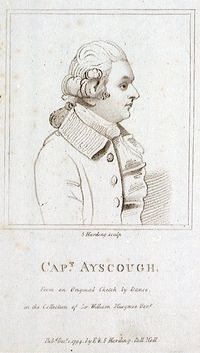
George Edward Ayscough (died 14 October 1779) was an English dramatist and traveller. [1]

George Edward Ayscough (died 14 October 1779) was an English dramatist and traveller. [1]
Ayscough was the son of Dr. Francis Ayscough, dean of Bristol, by a sister of the first Lord Lyttelton. For some time he held a commission in the Guards. [1]
In 1776, he produced at Drury Lane Theatre a play, a version of the Semiramis of Voltaire, Richard Yates representing the chief character; an epilogue was provided by Richard Brinsley Sheridan. The tragedy had eleven representations, and the English author enjoyed three benefits on account of it. On the first performance Captain Ayscough's brother officers attended in great force and secured the success of Semiramis. In the Biographia Dramatica , Ayscough is described as "a fool of fashion," "a parasite of Lord Lyttelton;" and his tragedy is condemned as contemptible. [1]
He left England on account of his failing health, and afterwards published some account of his travels in Italy. He was the editor of the Miscellaneous Works of his uncle, Lord Lyttelton, published in 1774. [2]

This article contains information about the literary events and publications of 1776.

David Mallet was a Scottish poet and dramatist.
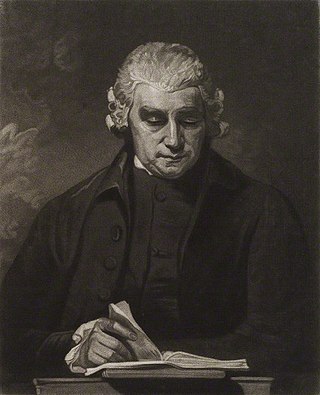
Isaac Reed was an English Shakespearean editor.
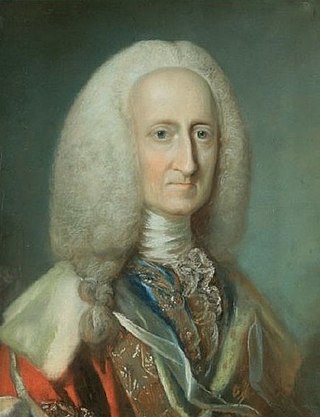
George Lyttelton, 1st Baron Lyttelton,, known between 1751 and 1756 as Sir George Lyttelton, 5th Baronet, was a British statesman. As an author himself, he was also a supporter of other writers and as a patron of the arts made an important contribution to the development of 18th-century landscape design.
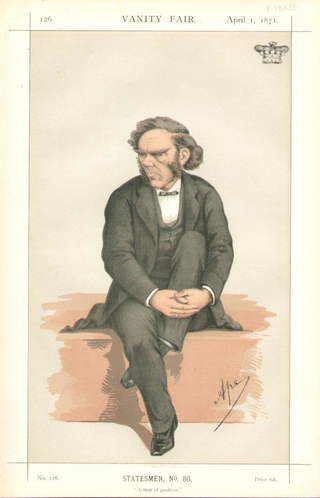
George William Lyttelton, 4th Baron Lyttelton, 4th Baron Westcote, was an English aristocrat and Conservative politician from the Lyttelton family. He was chairman of the Canterbury Association, which encouraged British settlers to move to New Zealand.
Gilbert West (1703–1756) was a minor English poet, translator, and theologian in the early and middle eighteenth century. Samuel Johnson included him in his Lives of the Most Eminent English Poets.

Frederic Reynolds was an English dramatist. During his literary career he composed nearly one hundred tragedies and comedies, many of which were printed, and about twenty of them obtained temporary popularity. Reynolds' plays were slight, and are described as having been "aimed at the modes and follies of the moment". He is still occasionally remembered for his caricature of Samuel Ireland as Sir Bamber Blackletter in Fortune's Fool, and for his adaptations of some of Shakespeare's comedies.
Sir Thomas Lyttelton, 4th Baronet, of Frankley, in the County of Worcester, was an English landowner and Whig politician who sat in the House of Commons from 1721 to 1741. He held office as one of the Lords of the Admiralty from 1727 to 1741.

William Henry Lyttelton, 3rd Baron Lyttelton MP was an English Whig politician from the Lyttelton family.

Alexander Dow was a Scottish Orientalist, writer, playwright and army officer in the East India Company.

Francis Ayscough (1701–1763) was a tutor to George III and Clerk of the Closet to his father Frederick, Prince of Wales and later Dean of Bristol Cathedral.
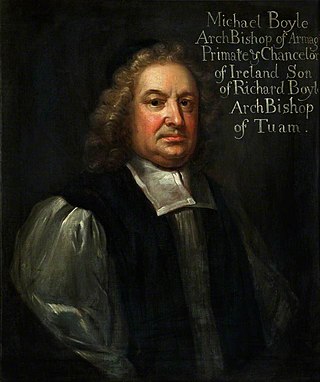
Michael Boyle, the younger was a Church of Ireland bishop who served as Archbishop of Dublin from 1663 to 1679 and Archbishop of Armagh from 1679 to his death. He also served as Lord Chancellor of Ireland, the last time a bishop was appointed to that office.

Sir Francis Fane of Fulbeck supported the Royalist cause during the English Civil War.
George Brewer was an English miscellaneous writer.
Stephen Jones (1763–1827) was an English literary editor, best known for his revision of the Biographia Dramatica.

Rev Robert Fleming (1660–1716) was a Scottish presbyterian minister, of liberal views, known as an early supporter of the principle of non-subscription to the Westminster Confession, and as an apocalyptic writer.
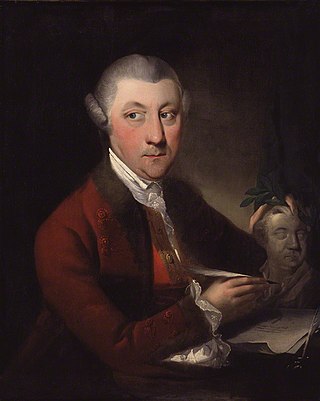
Thomas Hull (1728–1808) was an English actor and dramatist.

The Lyttelton family is a British aristocratic family. Over time, several members of the Lyttelton family were made knights, baronets and peers. Hereditary titles held by the Lyttelton family include the viscountcies of Cobham and Chandos, as well as the Lyttelton barony and Lyttelton baronetcy. Several other members of the family have also risen to prominence, particularly in the field of cricket.

William Parsons was a British actor and painter in the mid to late eighteenth century. He appeared mostly at Drury Lane and Haymarket in minor to supporting roles, but also had prominent roles in plays like Volpone and Hamlet.
This article is about the particular significance of the year 1703 to Wales and its people.
George Edward Ayscough.